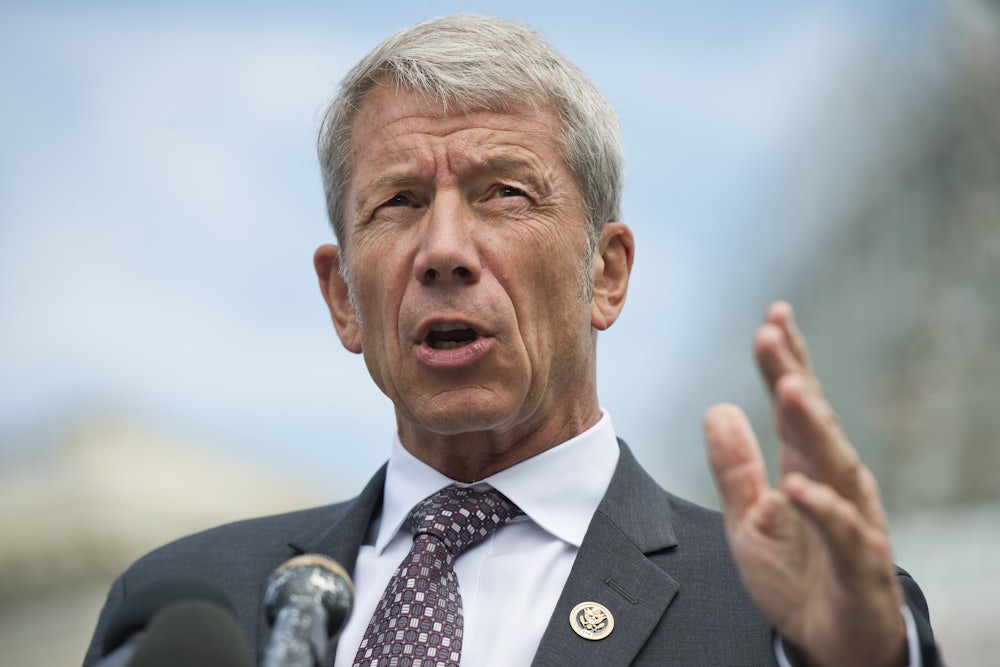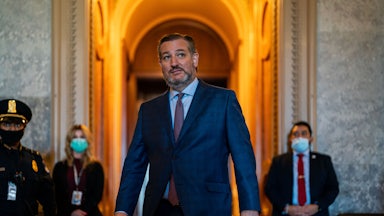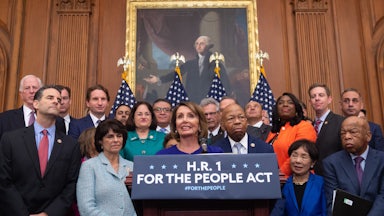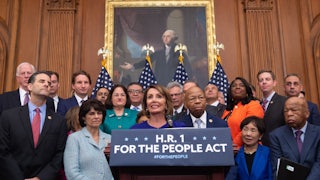On Monday, the eve of Oregon’s Democratic primary, The New York Times’ Shane Goldmacher reported on an odd, red-bordered box on an “obscure corner” of the campaign website of embattled 5th district incumbent Kurt Schrader. Inside the box was a carefully crafted “three-pronged takedown” of his opponent, Jamie McLeod-Skinner, with a “link to a two-page, opposition research document about her tenure as a city manager.”
Why was something so specific tucked away in a red box in the bowels of his website? As it turns out, it’s the same reason that similar red boxes have appeared on the websites of other Democratic candidates. As Goldmacher reported, the boxes helped these candidates overcome a supposedly thorny “challenge”: the need to evade campaign finance regulations that “bar candidates from directly coordinating with … outside groups.” Schrader “needed to alert” them to produce attack ads against McLeod-Skinner, so his campaign helpfully tucked away its rhetorical ammunition in a red-bordered box. Sure enough, outside groups armed themselves with it—not that it helped. At the time of this writing, Schrader was on the verge of losing to McLeod-Skinner.
As scoops about campaign finance shenanigans go, this was a good one. It’s hard to fault Goldmacher for bringing this chicanery to attention. What I would dispute, however, is the notion that evading these regulations can, in 2022, rightly be called a “challenge” for candidates to surmount. Schrader’s red boxes are hardly the first ploy invented by campaigns to circumvent the rules, nor the most elaborate: In 2014, the most popular way of dodging coordination bans was for campaigns to shoot lengthy B-roll footage and post it on their campaign websites, so that outside groups had professional-grade video of their favored candidates at the ready for ad campaigns.
I’d go so far as to question whether the rules that forbid coordination between campaigns and like-minded super PACs can be called “rules” at all. Whenever political reporters chronicle the goings-on between campaigns and outside groups, and wherever they catch a campaign acting shady, they’re quick to note that this ban on coordination exists. Perhaps it’s time to start telling a different story—that these rules are little better than a legal fiction: a promise to voters that arrived pre-broken.
In the first place, that a rule exists barring campaigns from coordinating with outside groups is not really a product of a sincere desire to curb money in politics; it’s merely a way of making the reality of massive sums of plutocratic boodle sluicing through our political system seem slightly more kosher. The firewall between campaigns and super PACs is the little hitch that supposedly makes it less easy for plutocratic donors to directly aid and influence campaigns. It hasn’t worked as planned.
In theory, the regulations permit the Federal Election Commission to levy unspecified civil penalties upon campaigns that break the coordination ban. In practice, the FEC is a highly dysfunctional agency that, as the Brennan Center’s Daniel Weiner reported, “has abandoned serious allegations of lawbreaking without investigating because its commissioners” frequently break down on partisan lines, resulting in a state of affairs that “has made it more difficult for candidates trying to follow the law, and easier for those willing to break [it].”
Even without this dysfunction, there’s no real mechanism for the FEC to investigate potential violations. As the Center for Public Integrity’s Corbin Hiar noted in 2012, “Small fines and infrequent investigations stem from the exceedingly difficult nature of investigating coordinating activities claims.” Former FEC Commissioner Karl Sandstrom told Hiar that a thorough investigation “requires evidence with respect to communications and conversations that took place, and usually those are not documented.”
Yes, that’s right, the rules barring coordination failed to take into consideration that the people working on campaigns and the people working for allied outside groups might be able to simply converse with one another. As Hiar noted, “The regulations governing independent expenditures are so specific that unless the commissioners have a witness to one of those consultations, the FEC is unlikely to gather enough evidence to open an investigation.” Another way of putting it is that to get punished for coordination violations, you have to be either incredibly brazen or incredibly stupid. On this basis, it’s hard to call these “regulations.” They may as well not exist; for all intents and purposes they don’t.
It’s honestly kind of adorable that campaigns like Schrader’s go to elaborate lengths to dodge the rules when there’s nothing really stopping campaign factotums and super PAC dark artists from simply meeting up at a bar to talk shop. Perhaps some campaigns actually do fear the FEC; perhaps some indulge their preference for cloak-and-dagger hijinks to mock its impotence. But it’s likely that more intense and direct coordination is happening between campaigns and dark money silos than even the most intrepid reporters are catching.
So it’s time for political journalists to stop maintaining the polite fiction that there are cops walking the campaign finance beat, using stringent restrictions to hold malefactors to account. There’s no longer a need to pretend that these campaign finance laws exist, nor for reporters to feign surprise over politicians’ flamboyant transgressions, like Casablanca’s Louis Renault pretending to be shocked that gambling is happening at Rick’s Café Américain. We can simply state plainly: The rules are a joke.
This article first appeared in Power Mad, a weekly TNR newsletter authored by deputy editor Jason Linkins. Sign up here.










